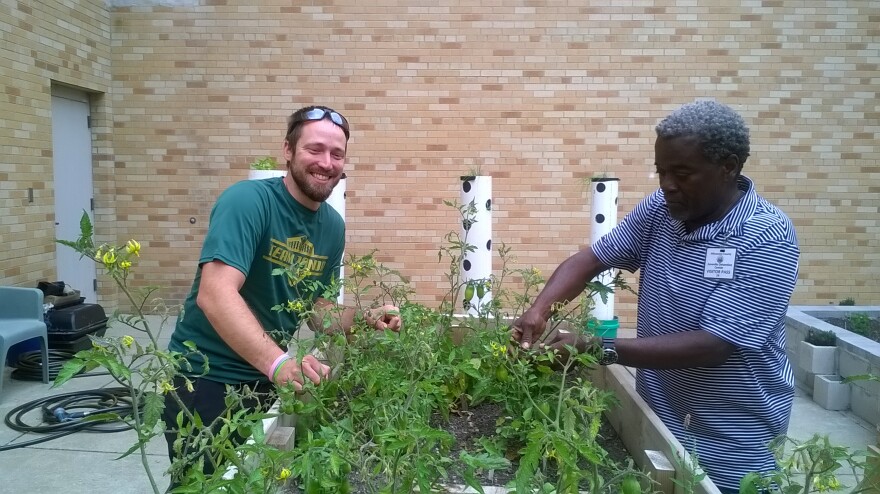Detention centers aren’t typically known for having green space, especially not in garden form. But there’s a school of practice that believes gardening holds healing powers—even behind bars.
Andre Ellis is one of those people. For the past four summers, he has run a neighborhood cleanup and gardening program, called We Got This, out of a community garden at Ninth and Ring on Milwaukee’s north side. The food grown there is shared not only with the young men who participate, but with the community.
READ: Milwaukee Man Starts Mentoring Program for Black Youth in 53206
“Healthy eating changes the thinking process of young people who never tried it. Once they try healthy food, it does something to their senses and then they want to inquire about it. And when they start learning about what’s good, they change their behavior. Once you change their behavior through how they eat, then they act differently in their learning behaviors. They began to read and their behaviors of being quiet and paying attention happen,” Ellis says.
Ellis says he’s now looking to help change the behavior of some of the young men detained at the Vel R. Phillips Juvenile Justice Center.
The space there is called the Garden of Hope and to get to it, Ellis and I had to be buzzed through several security doors before entering a courtyard that’s around 40 feet by 40 feet. The garden is surrounded by the tall brick walls of the facility, but if you look up, there’s nothing but blue sky.
Within the courtyard, there are tables where youth can sit, several garden beds that have been raised to waist height, towers made of PVC pipe and filled with dirt where strawberries and other plants will grow next year. On my visit late in the season, a few tomatoes were blooming, along with lettuce and jalapeno peppers, which Ellis couldn't help but try.
He says juveniles being held here helped to plant this stuff. And Ellis says he offered up a bit of wisdom while teaching them to plant in one of the raised garden beds. “I had about four or five kids in a box and I had their hands in the dirt and I said to them, everybody stop and look at me and keep your hands in the dirt. As long as your hands are in the soil, they can’t be on the steering wheel of a stolie (stolen vehicle), smacking a girl when you’re not supposed to or on the trigger of a gun. Keep your hands in the soil."
Ellis says he hopes that if there’s any takeaway, it’s that the young men are in control of their own lives: “A hustle does not have to be bad. When we teach them that they can grow food, then they’ll begin to think that they can grow anything. They are the producers of their own lives. They are the CEO’s of their own lives and when you grow and create your own things you can create your own business. I bet they don’t know the word entrepreneur."
Mitch Siefert sees other benefits to the garden. He’s an art teacher and co-wrote the grant for the garden.
“The rest of the building is a lot of concrete and this is one of the few spaces where you get green, you get blue sky. And whenever you’re seeing green, I think it’s a little bit more calming. You feel a little bit more connected,” Siefert says.
Siefert says the space is much more than a garden, it’s a learning environment. “If I want to take my art class out here and we hang out here and draw some different plants as far as a life drawing situation or just come out and enjoy the weather and enjoy our drawing project or you know, for reading teachers. If you’re going to be sitting reading, this is a great environment to sit down."
But the best thing about the garden is what it represents, according to Andre Ellis.
“Even while the young people are incarcerated, the garden will allow young people with good behavior a chance to come outside and I think that will provide hope. It’s the garden of hope,” he says.
The Milwaukee County Juvenile Justice Center has yet to decide if the program will operate through winter. If not, leaders say they’ll be ready to go next planting season.





